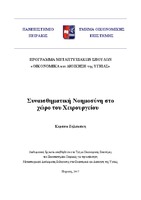Συναισθηματική νοημοσύνη στο χώρο του χειρουργείου
Emotional intelligence in surgery

Προβολή/
Λέξεις κλειδιά
Συναισθηματική νοημοσύνη ; Οργάνωση και διοίκηση ; Ηγεσία ; Ενσυναίσθηση ; Έμπνευση ; Παρακίνηση ; Ενδυνάμωση ; Αυτοανάπτυξη ; Αυτοεξέλιξη ; Emotional intelligence ; Management ; Leadership ; Empathy ; Inspiration ; Motivation ; Empowerment ; Self-development ; Self-improvementΠερίληψη
Η αυστηρότητα και ο τύπος δεν επιφέρουν τα αναμενόμενα αποτελέσματα. Καθαρή διοίκηση δεν μπορεί να καθοδηγήσει στις εξελίξεις λόγω διόγκωσης των περιορισμών και των αγκυλώσεων. Η ιεραρχία από μόνη της μόνο προβλήματα δημιουργεί αφού η από θέσεως ισχύς προκαλεί αδυναμίες, τόσο στον ίδιο που την ασκεί αφού δεν βελτιώνεται προς μια πιο ανώτερη πνευματικά εξουσία, στον άλλο που τη δέχεται αφού εξελίσσεται σε ένα εξαρτώμενο αποδέκτη τυπικής ισχύος και στην ποιότητα της μεταξύ τους σχέσης αφού αληθινή προσέγγιση και εμπιστοσύνη ποτέ δεν αναπτύσσονται μεταξύ τους. Με πυξίδα αυτές τις αξίες και όπλο την ενσυναίσθηση οι χειρουργικές ομάδες θα αποφύγουν τις απειλές της πνευματικής καταπόνησης, των επιδράσεων της σωματικής κόπωσης και της ψυχολογικής φθοράς που λόγω του εργασιακού αντικειμένου η θεραπεία και η διατήρηση της υγείας και της ζωής απειλούν να μετατρέψουν τους χειρουργικούς χώρους σε πεδία μαχών για τη ζωή αλλά με κόστος το ιατρικό και νοσηλευτικό προσωπικό. Αυτό απαιτεί εκτός της εξειδίκευσης, υψηλά επίπεδα ενσυναίσθησης και συναισθηματική ευφυΐα που θα εξασφαλίσουν τα εργαλεία, τους τρόπους και τις ικανότητες για επιτυχία. Τόσο η βιβλιογραφική έρευνα που απόδειξε το σημαντικό ρόλο της συναισθηματικής νοημοσύνης στην καθοδήγηση των δραστηριοτήτων και του προσωπικού στα χειρουργεία όσο και η ενδεικτική έρευνα που εκτελέστηκε, έδειξαν ότι υπάρχει ακόμη χώρος για εξέλιξη στον τρόπο εξάσκησης της διοίκησης και στην αντίληψη της ανάγκης για αναπροσαρμογή των δεδομένων στις χειρουργικές ομάδες κυρίως με αναθεώρηση των κριτηρίων μέτρησης της παραγωγικότητας και ιδιαίτερα στο παρανομαστή του κλάσματος υπολογισμού της που αφορά στην κατανάλωση πόρων. Η έννοια της προστασίας των πόρων από την ποιοτική φθορά είναι κάτι που καλείται να αναλάβει να εξασφαλίσει η συναισθηματική νοημοσύνη.


